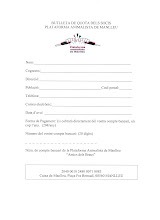Días 30 y 31 de Octubre y 1 de Noviembre
Lugar: ECOCENTRE
C/ Mallorca, 330
Barcelona
Metro: Verdaguer L4 y L5
Bicing: Passeig Sant Joan /Bailén-Aragó
Entrada libre
http://www.liberaong.org/nota_actualidad.php?id=1999
http://www.facebook.com/event.php?eid=157653214265689
dijous, 14 d’octubre del 2010
dimecres, 13 d’octubre del 2010
Make Animal Testing History achievements:
The Humane Society ens informa del que s'ha aconseguit al EU a favor de utilitzar mètodos alternatius a l'hora de fer experiments scientifics i mèdics: (És en anglès, si alú li interessa en particular, farem una traducció!!)
Make Animal Testing History achievements:
Campaign Call: Strategic direction to replace animals in research and testing through compulsory use of existing alternatives, and the creation of EU and national facilities dedicated to advancing additional non-animal methods.
Result: A European Union Reference Laboratory will be established, responsible for promoting the development and use of alternatives to animals including for medical research. Assisted by member states, it will also be responsible for validating alternative methods. Recital 10 of the new law states that 'this Directive represents an important step towards achieving the final goal of full replacement of procedures on live animals for scientific and educational purposes as soon as it is scientifically possible to do so.'
Campaign Call: Transparent systems of ethical evaluation and ethical review, application and authorisation, retrospective review and laboratory inspection reports.
Result: We achieved mandatory authorisation and project evaluation for all applications to use animals, including checks to ensure alternatives are used where possible. In many countries this will be the first time ever projects have been subjected to ethical scrutiny and it could prevent many experiments from being approved. Many experiments, including any classified severe or using non-human primates, will also be subject to retrospective assessment providing a vital opportunity for further scrutiny. Some non-technical summaries of applications will be published and laboratory inspections will be carried out, including unannounced visits.
Campaign Call: An immediate ban on the use of great apes and wild-caught primates in experiments, and the phasing out of all experiments on non-human primates in line with European Parliament Written Declaration 40/2007.
Result: The use of great apes is banned, with extremely limited opportunities to lift it. The EU ban will signal to countries like the USA, where chimpanzees are still used, that they need to follow suit. No ban on wild-caught primates but breeders must propose strategies to reduce reliance on monkeys born of wild-caught parents. No meaningful limits on the use of monkeys in experiments but opportunities may remain to reduce their use at national level, and we are committed to working towards a complete ban.
Campaign Call: Regular reviews of animal protection rules, and public reporting on progress made towards reducing animal suffering and replacing animal methods.
Result: The new EU legislation will be reviewed in seven years time, to allow for developments in animal welfare and alternative research techniques to be examined. In the meantime, thematic reviews may be conducted, in particular to review primate use.
Make Animal Testing History achievements:
Campaign Call: Strategic direction to replace animals in research and testing through compulsory use of existing alternatives, and the creation of EU and national facilities dedicated to advancing additional non-animal methods.
Result: A European Union Reference Laboratory will be established, responsible for promoting the development and use of alternatives to animals including for medical research. Assisted by member states, it will also be responsible for validating alternative methods. Recital 10 of the new law states that 'this Directive represents an important step towards achieving the final goal of full replacement of procedures on live animals for scientific and educational purposes as soon as it is scientifically possible to do so.'
Campaign Call: Transparent systems of ethical evaluation and ethical review, application and authorisation, retrospective review and laboratory inspection reports.
Result: We achieved mandatory authorisation and project evaluation for all applications to use animals, including checks to ensure alternatives are used where possible. In many countries this will be the first time ever projects have been subjected to ethical scrutiny and it could prevent many experiments from being approved. Many experiments, including any classified severe or using non-human primates, will also be subject to retrospective assessment providing a vital opportunity for further scrutiny. Some non-technical summaries of applications will be published and laboratory inspections will be carried out, including unannounced visits.
Campaign Call: An immediate ban on the use of great apes and wild-caught primates in experiments, and the phasing out of all experiments on non-human primates in line with European Parliament Written Declaration 40/2007.
Result: The use of great apes is banned, with extremely limited opportunities to lift it. The EU ban will signal to countries like the USA, where chimpanzees are still used, that they need to follow suit. No ban on wild-caught primates but breeders must propose strategies to reduce reliance on monkeys born of wild-caught parents. No meaningful limits on the use of monkeys in experiments but opportunities may remain to reduce their use at national level, and we are committed to working towards a complete ban.
Campaign Call: Regular reviews of animal protection rules, and public reporting on progress made towards reducing animal suffering and replacing animal methods.
Result: The new EU legislation will be reviewed in seven years time, to allow for developments in animal welfare and alternative research techniques to be examined. In the meantime, thematic reviews may be conducted, in particular to review primate use.
Subscriure's a:
Missatges (Atom)


